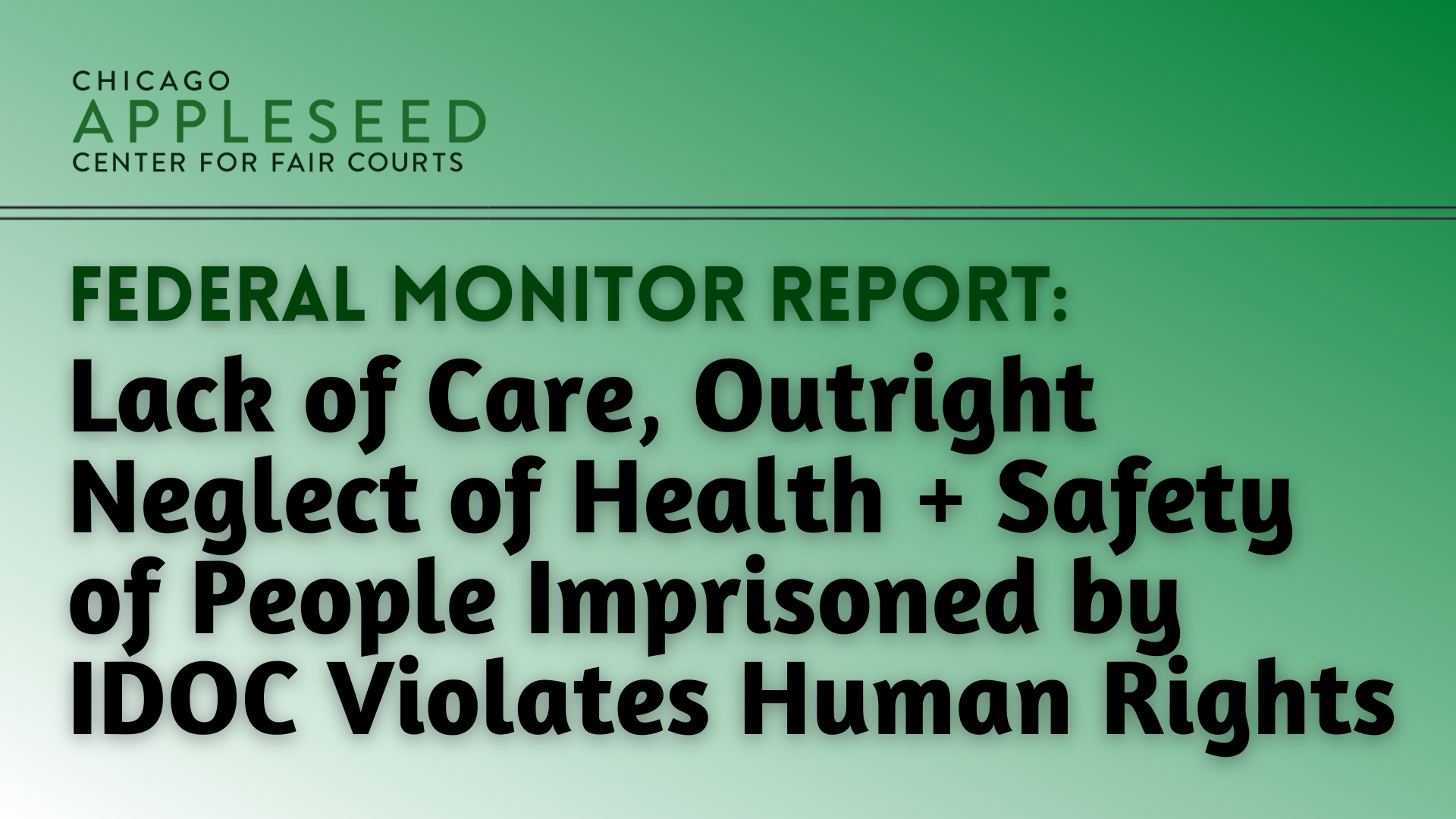Federal Monitor Report: Lack of Care, Outright Neglect of Health and Safety of People Imprisoned by IDOC Violates Human Rights 
On August 5, 2022, a federal court held the Illinois Department of Corrections (IDOC) in civil contempt of court for failing to comply with the requirements of a consent decree aimed at improving the unacceptable level of medical care provided to people in IDOC custody. The lawsuit, originally filed in 2010 by Uptown People’s Law Center, aims to completely overhaul the healthcare system that serves the approximately 30,000 people in Illinois prisons. The contempt order comes in conjunction with the 5th report issued by the federal monitor, which paints a dismal picture of the level of care provided in Illinois’ prisons.
The lack of care and outright neglect of the health and safety of people in IDOC custody is a human rights violation. The federal monitor’s scathing report notes, among other things that:
- IDOC has failed to provide necessary information to the federal monitor. IDOC failed to provide documents responsive to over 80% of the monitor’s requests for information in January 2022, including basic information like administrative directives and forms currently in use.
- There is no statewide plan for the care of elderly patients with severe disabilities or end-stage chronic illnesses. Infirmary capacity is being used for these patients, taking up beds and leaving other people in IDOC custody who need medical care in the general population.
- The records that were provided by IDOC show a level of “patient care that appeared consistent with neglect and abuse.” IDOC is not appropriately hospitalizing imprisoned people who need treatment, instead keeping them in understaffed, under-equipped prison infirmaries.
- Conditions are particularly egregious for people with cognitive disorders like dementia. IDOC punished people for behavior that was caused by their cognitive decline, while failing to provide adequate, basic care. Patients with dementia were “not being given sufficient fluid for hydration,” and IDOC was “not helping with eating, not monitoring the patient’s nutrition, and [was not] providing insufficient supervision for the patients in order to prevent harm to the patient.”
The lack of progress highlighted by the monitor’s report is particularly unfortunate given that the Illinois Legislature has given IDOC a new tool to help make sure that individuals who are terminally ill or medically incapacitated can get the care they need. The Joe Coleman Medical Release Act, which became law in January of 2022 – thanks in part to efforts by Chicago Appleseed Center for Fair Courts and the Illinois Prison Project – allows people who are terminally ill or medically incapacitated to apply for release through the Prisoner Review Board (PRB). Although several dozen people have been granted release since the law went into effect, hundreds, if not thousands, of people are still languishing in IDOC custody who pose no threat to the community and whose needs would be better (and more economically) served outside of the prison system.
Unfortunately, the monitor’s report notes that “the Department has provided no information in response to the Monitor’s requests for a progress report on releases according to [the Joe Coleman Medical Release Act].” The report lays out a roadmap for IDOC to use in implementing the bill, noting:
All admission to infirmary beds should be reviewed retrospectively for appropriateness and timeliness. All persons expected to need infirmary placement longer than two weeks should be reviewed prospectively, the long term plan of care reviewed, and most appropriate placement determined (including consideration of parole or commutation or transfer to a more appropriate facility).
If IDOC appropriately implemented this recommendation, it would surely identify the many prisoners currently in need of treatment that prisons cannot provide, and the department could put them in the pipeline towards release.
The State of Illinois cannot allow the current situation to continue. It is a black mark on Illinois that vulnerable people who lack the ability to care for themselves are being neglected and abused while in imprisoned by the state. The contempt ruling by a federal judge is an important first step; IDOC must be held accountable to fulfill its legal and moral obligation to provide sufficient care for people in its custody, and to route as many people as possible towards the new medical release system.
To learn more about the steps that can be taken to free terminally-ill incarcerated people in Illinois under the Joe Coleman Medical Release Act, visit the Illinois Prison Project’s website.

